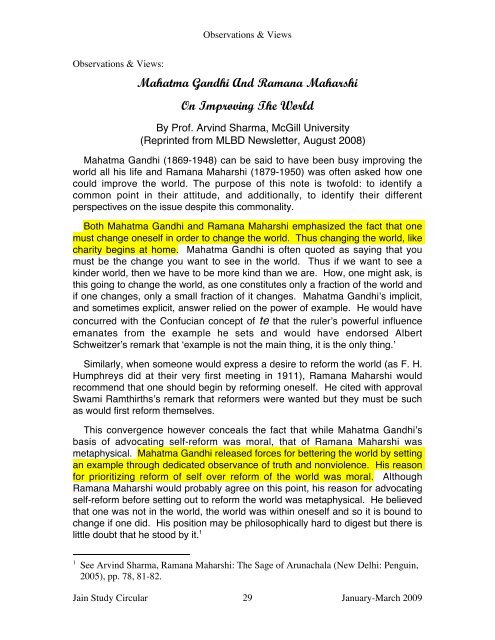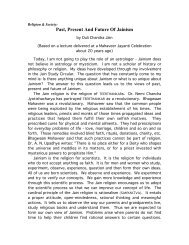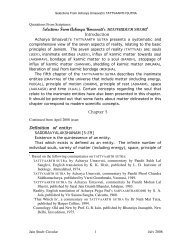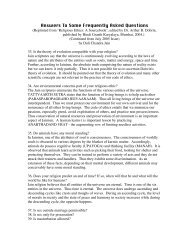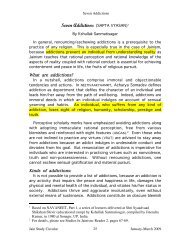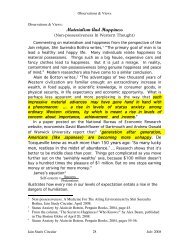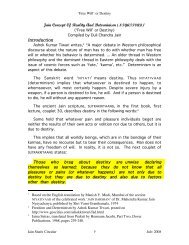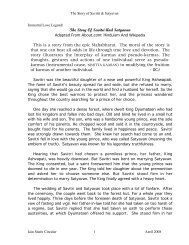Mahatma Gandhi And Ramana Maharshi On Improving The World
Mahatma Gandhi And Ramana Maharshi On Improving The World
Mahatma Gandhi And Ramana Maharshi On Improving The World
You also want an ePaper? Increase the reach of your titles
YUMPU automatically turns print PDFs into web optimized ePapers that Google loves.
Observations & Views<br />
Observations & Views:<br />
<strong>Mahatma</strong> <strong>Gandhi</strong> <strong>And</strong> <strong>Ramana</strong> <strong>Maharshi</strong><br />
<strong>On</strong> <strong>Improving</strong> <strong>The</strong> <strong>World</strong><br />
By Prof. Arvind Sharma, McGill University<br />
(Reprinted from MLBD Newsletter, August 2008)<br />
<strong>Mahatma</strong> <strong>Gandhi</strong> (1869-1948) can be said to have been busy improving the<br />
world all his life and <strong>Ramana</strong> <strong>Maharshi</strong> (1879-1950) was often asked how one<br />
could improve the world. <strong>The</strong> purpose of this note is twofold: to identify a<br />
common point in their attitude, and additionally, to identify their different<br />
perspectives on the issue despite this commonality.<br />
Both <strong>Mahatma</strong> <strong>Gandhi</strong> and <strong>Ramana</strong> <strong>Maharshi</strong> emphasized the fact that one<br />
must change oneself in order to change the world. Thus changing the world, like<br />
charity begins at home. <strong>Mahatma</strong> <strong>Gandhi</strong> is often quoted as saying that you<br />
must be the change you want to see in the world. Thus if we want to see a<br />
kinder world, then we have to be more kind than we are. How, one might ask, is<br />
this going to change the world, as one constitutes only a fraction of the world and<br />
if one changes, only a small fraction of it changes. <strong>Mahatma</strong> <strong>Gandhi</strong>’s implicit,<br />
and sometimes explicit, answer relied on the power of example. He would have<br />
concurred with the Confucian concept of te that the ruler’s powerful influence<br />
emanates from the example he sets and would have endorsed Albert<br />
Schweitzer’s remark that ‘example is not the main thing, it is the only thing.’<br />
Similarly, when someone would express a desire to reform the world (as F. H.<br />
Humphreys did at their very first meeting in 1911), <strong>Ramana</strong> <strong>Maharshi</strong> would<br />
recommend that one should begin by reforming oneself. He cited with approval<br />
Swami Ramthirths’s remark that reformers were wanted but they must be such<br />
as would first reform themselves.<br />
This convergence however conceals the fact that while <strong>Mahatma</strong> <strong>Gandhi</strong>’s<br />
basis of advocating self-reform was moral, that of <strong>Ramana</strong> <strong>Maharshi</strong> was<br />
metaphysical. <strong>Mahatma</strong> <strong>Gandhi</strong> released forces for bettering the world by setting<br />
an example through dedicated observance of truth and nonviolence. His reason<br />
for prioritizing reform of self over reform of the world was moral. Although<br />
<strong>Ramana</strong> <strong>Maharshi</strong> would probably agree on this point, his reason for advocating<br />
self-reform before setting out to reform the world was metaphysical. He believed<br />
that one was not in the world, the world was within oneself and so it is bound to<br />
change if one did. His position may be philosophically hard to digest but there is<br />
little doubt that he stood by it. 1<br />
1<br />
See Arvind Sharma, <strong>Ramana</strong> <strong>Maharshi</strong>: <strong>The</strong> Sage of Arunachala (New Delhi: Penguin,<br />
2005), pp. 78, 81-82.<br />
Jain Study Circular 29<br />
January-March 2009
Observations & Views<br />
How To Deal With Terrorism 2<br />
Based on the article ‘Give Ahimsa A Chance’ by Rev. Valson Thampu, 3<br />
published in <strong>The</strong> Hindu, Magazine Section, November 9, 2008<br />
URL: www.thehindu.com/thehindu/mag/2008/11/09/stories/2008110950150500.htm<br />
Terrorism is a serious problem in some regions of the world. Many<br />
resourceful nations have resorted to a variety of ingenious techniques to<br />
combat terrorism, with not much success. To deal with terrorism they<br />
have tried to match force with force and beef up security to outsmart the<br />
terrorists. This approach involves mistrust and hatred, which constitute<br />
mental violence. History is witness to the fact that violence breeds<br />
further violence. Thus the cycle of violence does not end. No effort is<br />
made to understand the viewpoint of the terrorists. <strong>The</strong> society does not<br />
pay any attention to the feelings of the terrorists. No body shows any<br />
sympathy for their plight. Rev. Valson Thampu has observed, “Since<br />
fighting terrorism with terror has not yielded the desired result, there is<br />
an urgent need for an alternate paradigm. … <strong>The</strong> AHIMSAK (nonviolent)<br />
option is to prevent or overcome enmity. Unwavering commitment to<br />
truth is the essence of hospitality as well as AHIMSA (nonviolence).” This<br />
alternative to hostility and confrontation is hospitality and nonviolence.<br />
<strong>The</strong> sagacious writer, Valson Thampu, continues, “While the outlook of<br />
hostility endeavors to eliminate ‘the enemy’, the paradigm of hospitality<br />
seeks to eradicate ‘enmity’. <strong>The</strong> paradigm of ‘a tooth for a tooth’, as an<br />
anti-terror strategy, targets the enemy, who targets innocent human<br />
beings because he cannot get at his enemy. It is no longer ‘a tooth for a<br />
tooth’ but ‘as many innocent and indiscriminate teeth as possible for a<br />
tooth’. Violence spreads, gets glorified, and its logic penetrates deeper<br />
into the collective psyche.<br />
“<strong>The</strong> AHIMSAK option, on the contrary, is to prevent or overcome<br />
enmity. Almost invariably, enmity is based on falsehood. Unwavering<br />
commitment to truth is the essence of hospitality as well as AHIMSA. <strong>The</strong><br />
truth about others can be known only by accepting them. At a distance<br />
there is only propaganda. Propaganda is nothing but word-pelting. It is the<br />
whirligig of hostility aimed at aggravating alienation. Truth is to<br />
hospitality what falsehood is to hostility. Falsehood is the offspring of<br />
2 Please see ‘Nonviolence <strong>And</strong> Relativism: Means To Heal <strong>The</strong> Scourge Of Terrorism’,<br />
published in Jain Study Circular, January-April 2005, pages 20-24.<br />
3 Rev. Valson Thampu is the Principal of St. Stephen’s College, New Delhi.<br />
Jain Study Circular 30<br />
January-March 2009
Observations & Views<br />
fear. Fear and mutual suspicion make us eager to lap up the propagandist<br />
falsehood dished out as though it is the ultimate truth.<br />
“We can only do better by shifting from the mindset of hostility to that<br />
of hospitality, which is also the necessary foundation for ‘unity-indiversity’,<br />
as our doctrine for overcoming terror! <strong>The</strong> curse of terrorism is<br />
not merely that several innocent lives are lost, tragic as that surely is.<br />
<strong>The</strong> greatest peril of terrorism is that it tears apart the fabric of unity-indiversity.<br />
Terrorism, and the strategies for countering it predicated on<br />
hostility, are weakening the sinews of our unity as a nation. Standing<br />
inflexibly by the ‘tried and failed’ strategy of overcoming force by force<br />
amounts to dogged irresponsibility.<br />
“’Peace,’ as John Milton says, ‘has its trophies not less than war.’ <strong>The</strong><br />
resources and strategies of peace and nonviolence need to be given a<br />
chance, even as a matter of honoring our unique spiritual heritage, in<br />
healing the nation of this rising epidemic of terror, untruth and alienation.<br />
India cannot afford to be a house of hostility. We, all Indians, are<br />
neighbors who need to love each other. We are brothers and sisters. ‘A<br />
house divided against itself’, as Abraham Lincoln said, ‘cannot stand’.<br />
India must stand, and stand united and strong; not just for our sake, but<br />
also for the sake of the world. <strong>The</strong> strength of a nation is not in its<br />
firepower, but in its unity-power!<br />
“Hospitality, or unprejudiced openness to each other, is the seed of<br />
unity. We become one, when we accept each other as we are and seek<br />
together that we may become, as a people, what we need to be.”<br />
* * * * * * *<br />
Non-possessiveness: An Aspect Of Nonviolence<br />
Based on the article ‘<strong>The</strong> Ahimsa Way: Living A Simple Life’ by Usha<br />
Jesudasan, 4 published in <strong>The</strong> Hindu, Magazine Section,<br />
November 16, 2008<br />
URL: www.thehindu.com/thehindu/mag/2008/11/16/stories/2008111650100400.htm<br />
According to Usha Jesudasan, the apparently insatiable urge to<br />
possess things is a form of violence too. She says, “<strong>On</strong>e of the subtle<br />
forms of violence today is the tyranny of accumulation. Modern culture,<br />
based on productivity, greater profits, and, pounding advertisements,<br />
keeps giving us false needs. … <strong>The</strong> AHIMSAK (nonviolent) way of life<br />
embraces simple living - whether that is a non-accumulative life; a non-<br />
4 Usha Jesudasan is a writer and social worker. Her website is www.ushajesudasan.com.<br />
Jain Study Circular 31<br />
January-March 2009
Observations & Views<br />
possessive relationship life; or a life which desires to live in justice and<br />
harmony with everything around us.”<br />
Many people have a tendency to accumulate goods and services. <strong>The</strong>y<br />
go for fancy clothes, shoes, cell phones, cars and houses. <strong>The</strong>y also<br />
compete with others in this regard making sure that they have all that<br />
their neighbors have. <strong>The</strong>y go to great lengths to guard and protect their<br />
possessions. <strong>The</strong>se tendencies make life very complicated and lead to<br />
considerable mental anguish, which is an aspect of violence.<br />
In the pursuit of materials, people become possessive of certain<br />
individuals as well. Usha Jesudasan writes, “Apart from the many things<br />
we insist on owning, the HIMSAK (violent) way of life also makes us relate<br />
to people as possessions. Just as we cling to our clothes, perfumes and<br />
handbags, we also become possessive about our relationships. <strong>On</strong>ce<br />
someone has offered us friendship, affection, love or care in some way<br />
[for example, by giving gifts], we want more and more of the same thing.<br />
So we cling to the person who gave it to us, forgetting that they too are<br />
human with deep similar needs. When they share their goodness with<br />
others, or are unable to give us more of what we need, we become HIMSAK<br />
people - attacking, accusing, abusing and discarding them.”<br />
According to Usha Jesudasan, the way of nonviolence consists in living<br />
a simple life with contentment. She writes, “Living simply also means<br />
living contentedly. When the commercial world tells us to want more and<br />
more, contentment is not about getting more and more, it is about being<br />
happy with what we have. Being content with what we have, gives us the<br />
power to say, ‘Enough’. … To truly live the AHIMSAK way, each one of us<br />
needs to make lifestyle changes. We need to think about where and in<br />
which area of our lives we would begin and make positive changes. We<br />
can ask our children to give away a pair of shoes or their clothes when<br />
they buy new ones. Or we could buy a sack of rice or DAL (lentils) for our<br />
maid or driver when we buy one for our family; or empty our minds of<br />
anger, frustration envy and greed when we are at bursting point with<br />
them.”<br />
<strong>The</strong> insightful writer continues, “As we pursue the simple way of life,<br />
according to our own paths, we realize that experiencing the inward<br />
reality of simplicity, taught by all our scriptures, liberates us outwardly<br />
too. Speech becomes truthful and honest. <strong>The</strong> lust for status and position<br />
slowly disappears because we no longer need them. We cease from showy<br />
extravagance not on the grounds of being unable to afford it, but on the<br />
grounds of principle. Our possessions become more available to others.”<br />
Jain Study Circular 32<br />
January-March 2009


